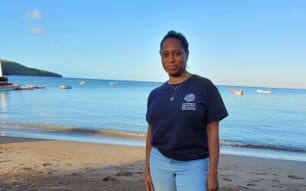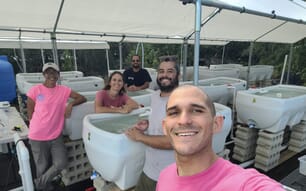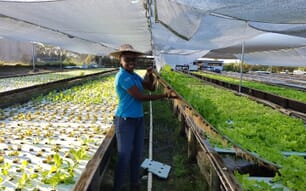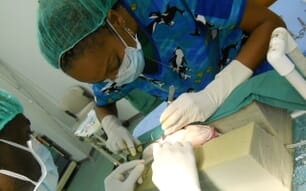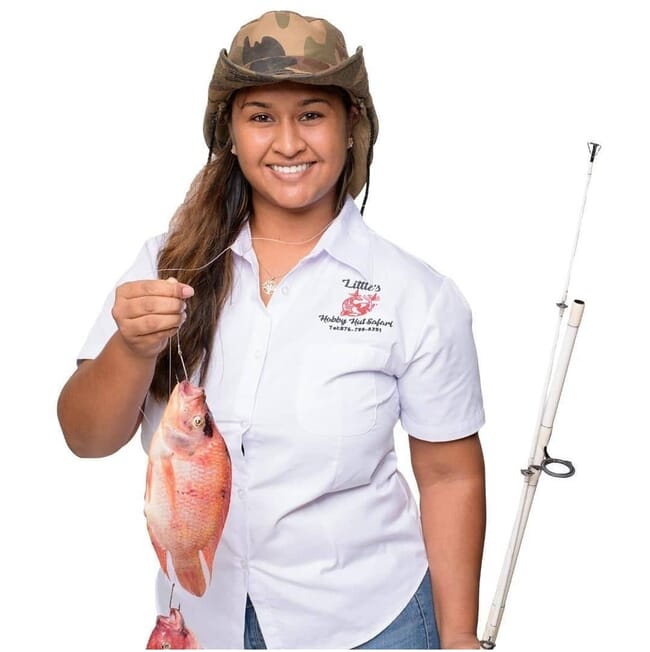
Her farm is approximately 20 acres and grows a range of species including tilapia, snook, tarpon, red belly pacu and Japanese koi.
Briefly describe your aquaculture career
I am a marine ecologist and fish farmer with 11 years’ experience in both fields. I am currently pursuing my PhD in marine biology and I also operate Little’s Hobby Hut Fish Farm, with an onsite bar and restaurant.
What inspired you to pursue a career in aquaculture?
I was introduced to fish farming at the age of six, when my dad bought a farm. My weekends were spent crab hunting, fishing and rowing on the farm. From these experiences, I learnt about different fish species, harvesting fish and cooking.
At the University of the West Indies, in Kingston, I pursued a degree in environmental biology which included courses in aquaculture, ecology and marine ecology. The combination of these courses highlighted the interdisciplinary roles that play in our aquaculture sector. My love for the marine environment, coupled with the experience gained from my family business, inspired me to learn more and, over the years, I realised that there is a niche market for recreational inland fishing. Inspiration was also found in potential for business opportunities in the field of aquaculture.
What does your PhD focus on?
On developing monitoring protocols that can be used to assess coastal fish populations, especially in marine protected areas.
What size is your farm and what species do you produce?
The farm is approximately 20 acres and we have tilapia, snook, tarpon, red belly pacu (Colosoma) and Japanese koi.
How can freshwater fisheries contribute to marine conservation?
Studies have shown that Jamaica’s coastal fisheries have been severely overfished since the 1980s. Efforts have been made to conserve our marine fisheries and marine ecosystems through open and closed seasons, gear restrictions and no take areas/marine protected areas. However, the demand for fish, which is an important source of protein, has been growing and will continue to grow as populations increase. Freshwater recreational fisheries can offset this pressure on the marine ecosystem as anglers can catch and eat their own high quality fish – red tilapia – which is produced and grown locally. Through these fisheries, fish is available year-round and is more cost-effective for the consumer compared to marine fisheries. With the right marketing strategy, inland fishing can be an important contributor of fish to the population.
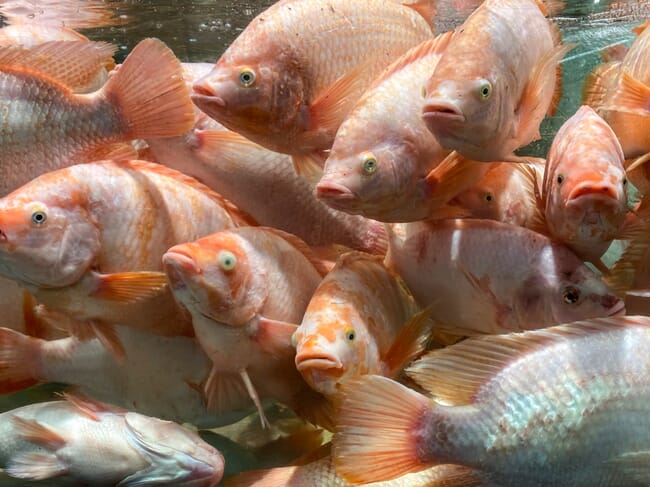
Guya enjoys introducing people to tilapia as an alternative to marine fish and teaching them the various ways it can be cooked © Shutterstock
How did you get involved in the Branson centre and how has that helped your business?
The Branson Centre of Entrepreneurship in the Caribbean had a blue economy programme that was geared to entrepreneurs like me whose objective was to highlight the importance of the marine environment to the economy. I was contacted by one of the programme members, who saw my business advertised on social media. I was invited for an interview and then selected to be a part of the programme. This programme has been such a great experience for me. It has taught me about marketing strategies, business models, growth strategies and financials.
However, midway during the programme, the pandemic affected both the course and my business. The programme organisers quickly reshuffled and taught us more about recovering, being resilient and adapting to a changing environment. I had to do some restructuring in my business and have been learning and adapting since.
Describe a typical day
My day starts from the night before! I try to make a list of things I want to achieve or get done during the week. In the morning, I tend to my two children and get them ready to go to their grandparents and school. I then pay bills, buy stock, manage inventory, micromanage farm workers until I get to the farm. I consult with my dad, who is the operations manager, on goals/objectives for the month. I also do payroll, marketing and handle the financials.
How do you juggle motherhood, graduate school and managing a farm?
It has been challenging, especially with two children under 3 and the pandemic. I get help from both grandparents, as well as the aunties and uncles. It really does take a village to raise children! I try get as much done during that time, but it can be quite challenging at times, as you have to know when to switch roles between mom, wife, boss, teacher, student and just being human.
What's the most inspiring experience you’ve had working in aquaculture to date?
One of my greatest experiences working at the farm is introducing people to fishing and the relaxing, therapeutic feeling that nature has to offer. My dad taught me "if you give a man a fish, you feed him for a day, if you teach a man to fish, you feed him for a lifetime". This has inspired me to be an avenue for dads, moms, friends, and even total strangers to come together and learn how to fish or make it a family event to visit the farm to get together and fish.
Furthermore, during this bonding time, I get to teach them about tilapia as an alternative to marine fish and the various ways it can be cooked. My farm basically becomes a part of someone’s childhood, just as it was for mine, and that makes it the most inspiring experience.
What's been your greatest achievement in aquaculture?
One of my greatest achievements is creating a niche business that highlights Jamaica’s beautiful coastal landscape, promotes inland fisheries and the conservation of the marine environment.
What do you enjoy most about your work?
I love to see people happy and bonding with each other, especially when they catch their first fish. You get to be a part of one of their greatest memories.
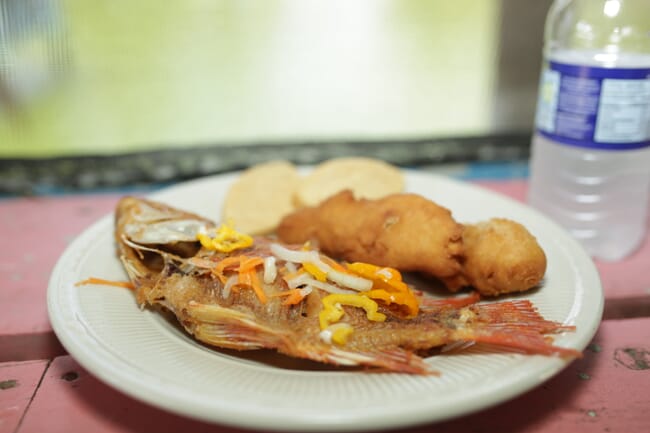
Guya argues that encouraging anglers to catch and eat fish on farms helps to reduce pressure on dwindling stocks of wild fish
Have you faced any challenges as a woman in aquaculture?
Aquaculture in Jamaica is dominated by men. Being a woman and bringing something new to the table with regards to how to market and promote tilapia/inland fisheries, has been difficult. I have been told it is a man’s world and – as woman – at times your opinions and concerns are not taken into consideration, especially if it relates to the operations.
What advice would you give to women looking to start a career in the sector?
My advice to other women is to be resilient, be different, think outside of the box, think of ways it hasn’t been done before and – if you are passionate – don’t take no for an answer. In this male-dominated sector, you will be challenged but never lose focus of your goals and always trust your instincts.
What would be your dream role in aquaculture and do you think it is realistic to achieve?
My dream role in the aquaculture industry is to be a game-changer: to highlight different business models for fellow farmers, to create niche markets for farmers, to introduce patrons to different types of fish farms (whether ornamental or food fish) and to educate persons on the importance of the sector as it relates to the conservation of the marine environment.
I want to help farmers to be more efficient in farming practices and find ways of cutting the high costs associated with the industry through applied research. With my experience and educational background, this is a realistic goal – whether I choose to be a lecturer, a farmer, a businesswoman or a researcher.
What is your ultimate ambition?
To recreate the face of aquaculture to highlight the important roles women play in the sector as farmers, business owners and policy makers.

